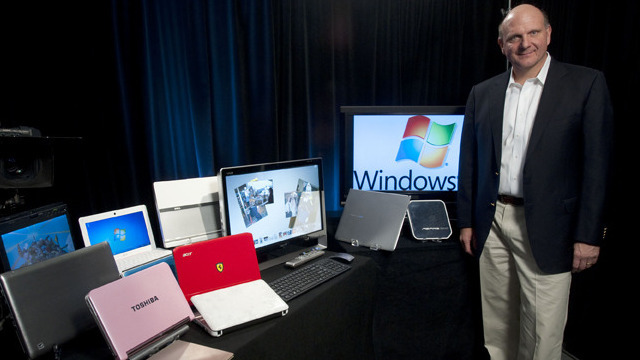
Businesses have dragged their feet on upgrading from the ten-year-old Windows XP to newer versions of Microsoft’s operating system. First, they skipped Windows Vista en masse after the OS was the target of scorn from critics and IT analysts. Now, they are making the upgrade to Windows 7, but analysts at Gartner are worried some XP-using businesses will consider skipping Windows 7 in anticipation of next year’s release of Windows 8.
This would not be wise, Gartner and other analyst firms say. Microsoft will end support for Windows XP in April 2014. For a home user, that is a long time away. But enterprises have long deployment cycles for new operating systems that depend heavily on budgets, internal processes and third-party vendors updating applications to support the latest version of Windows.
“Windows 8 is an ambitious product, and organizations running late with Windows 7 may be considering it,” Gartner analysts wrote in a research note published this week. “However, enterprises running XP should stick with Windows 7 migration plans to avoid the risk of a gap in support.”
Gartner’s Michael Silver has argued that many businesses will opt for Windows 7 and skip Windows 8 because of “migration fatigue.” But a minority may be tempted to do just the opposite because Windows 8 is so tantalizingly close.
“Since Microsoft unveiled Windows 8 in June, and even before that, people would call up say, ‘hey can we get away with skipping an extra release?’” Silver tells Ars. “It’s human nature.”
Gartner is telling those clients not to wait.
“Even if Windows 8 ends up shipping in the middle of 2012, which is pretty ambitious, the typical organization won’t be able to deploy it until the beginning of 2014, and thats three months before support ends for XP,” Silver says. “If you’re talking about a 10,000-user organization, that could be 1,000 applications, 500 of which require Windows. Preparing, planning, testing and remediating applications for an operating system generally takes an organization 12 to 18 months.”
Businesses had trouble moving to Vista because software vendors did not immediately update applications to fully support the new OS, Silver says. The same could happen with Windows 8, which will introduce a drastically different interface that business users may have difficulty adjusting to.
“You’re going to be better off on Windows 7 than you are on Windows 8, at least in the short term,” Silver argues.
Windows XP still accounted for 59.9 percent of corporate desktops in March 2011, down from 67.5 percent a year prior, according to research the analyst firm Forrester conducted using its clients as a sample base. Windows 7 was up to nearly 21 percent of corporate desktops by March of this year, while Vista had only 6.2 percent, Forrester said.
While those numbers are a bit old and based on a limited data set, research from Net Applications shows that Windows XP is still king. Based on data from users worldwide, including both businesses and consumers, Windows XP accounts for 52.46 percent of desktop usage today, compared to 30.6 percent for Windows 7.
After April 2014, Microsoft won’t offer security fixes for XP to the general public. Businesses can purchase custom support after that date, but this could cost up to $200,000 in the first year, according to Silver. That price is for customers who pay for Software Assurance. If you don’t have Software Assurance support, getting custom support for XP after 2014 could cost $500,000 in the first year.
Analyst Wes Miller of Directions on Microsoft doesn’t believe there’s a big danger of organizations skipping Windows 7 to wait for Windows 8. Microsoft has made it clear that “if you have a machine that will run Windows 7, it will run Windows 8 just as well, if not better,” he says. “Waiting to deploy Windows 7 would probably be a mistake.”
Windows 7 has appealed to businesses with greater security, stability and performance than XP, Miller noted. “It had an enterprise draw that Vista didn’t have,” he said. While Windows 8 brings a new touch-friendly interface designed to compete against the iPad and Android devices, it won’t necessarily have the same appeal for businesses. “There hasn’t been an enterprise theme given for Windows 8 yet,” Miller says.
Windows 8 does bring the appeal of being designed for new hardware form factors, however. Microsoft and hardware partners are planning handheld tablets, touchscreen monitors and ARM-based devices. Windows 8 PCs are also expected to ship with a secure boot technology to prevent rookits and other attacks, and have faster startup and shutdown times. While you’ll be able install Windows 8 on a PC running Windows 7 today, you may not get all the benefits available to those who purchase new hardware next year.
If you buy now, Miller notes, “you take a gamble that hardware will be upgradeable.”
That being said, moving from Windows XP to 7 already poses problems related to application compatibility. Going from XP to Windows 8 would be even more complicated.
Miller recently spoke with a petroleum company that is migrating to Windows 7 today, and has little immediate interest in Windows 8. According to Miller, officials at the company say “We won’t do anything with [Windows 8] until it is released and we’ve seen more enterprise readiness.”
Listing image by Photograph by www.microsoft.com
reader comments
178